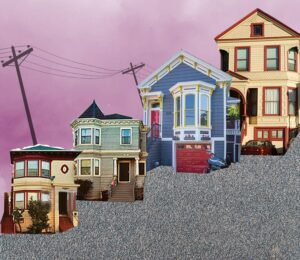
For as long as I can remember, the way I dressed was an expression of my emotions for that day. At the same time, my style evolved tremendously from that “tomboyish” kid with the big sweatshirts, bright nail polish and big hoop earrings to having fashion inspirations such as Zoe Kravitz and Janet Jackson in 1993. If anyone sees me on campus, they’ll probably see me in form-fitting clothes and different shades of red on my lips.
It has taken me a long time to embrace my sexuality, especially through my wardrobe. However, I still encounter naysayers about my choices—from revealing my body to the supposed conformity that I’m exhibiting as I make myself an “object of desire.” There’s even the argument that I’m contributing to my own “oppression” as someone that cares about her appearance, according to a former girlfriend of mine.
It didn’t take long for me to realize that feminism and fashion have a complex relationship with each other. I’ve paid attention to all the backlash and criticism that designers like Tom Ford and Karl Lagerfeld received in the past for objectification with their models and choices. I noticed so much slut shaming based on fashion choices, including from my own family and friends. I’ve even heard my mom blame a woman’s attire for a possibility of being attacked by a man at night while we were at a store. The compatibility between feminism and fashion can be seen as one similar to water and oil.
At the same time, there are those that argue for the importance of fashion in feminism. According to writer Linda M. Scott’s book Fresh Lipstick: Redressing Fashion and Feminism, the two have a much more intricate connection that traces back to the women’s suffrage movement. She argues that fashion has a connection to identity and expression for women, and should not be a means of objectification and attack from both men and women.
In the meantime, I’ve also noticed that I (as a Black woman) am objectified differently from white women. With my fashion choices and my body type, I’m seen in a more harsh light from men and women alike. Either I will get stares, critical eyes and/or catcalls, depending on the occasion. Overall, because of my choices in wardrobe and appearance as a Black woman and woman of color, I get more hypersexualized on the street than I should (which shouldn’t happen at all).
To me, fashion plays a significant role in one’s identity. However, it should not be the defining factor for me as a woman. I understand where feminists want to break away from gender norms and/or binaries through styles and appearances.
For me, I just happen to be “feminine” in expressing my feminism; people are going to like it or hate it. Either way, it goes back to the power of choice. I choose to express aspects of my feminism through my style.
My red lipsticks, crop tops and long black boots play a role in my style. It plays a role in my feminism as a display of sexual empowerment as a queer Black woman. However, it does not give anyone the right to objectify me. I make my style choices for myself, not for anyone else.


